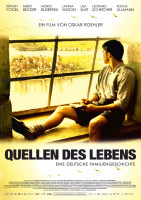Quellen des Lebens Filming Locations
Quellen des Lebens Filming Locations
Berlin, Germany’s capital, dates to the 13th century. Reminders of the city's turbulent 20th-century history include its Holocaust memorial and the Berlin Wall's graffitied remains. Divided during the Cold War, its 18th-century Brandenburg Gate has become a symbol of reunification. The city's also known for its art scene and modern landmarks like the gold-colored, swoop-roofed Berliner Philharmonie, built in 1963.
Italy, a European country with a long Mediterranean coastline, has left a powerful mark on Western culture and cuisine. Its capital, Rome, is home to the Vatican as well as landmark art and ancient ruins. Other major cities include Florence, with Renaissance masterpieces such as Michelangelo’s "David" and Brunelleschi's Duomo; Venice, the city of canals; and Milan, Italy’s fashion capital.
Leipzig is the most populous city in the German state of Saxony. The city has a population of 628,718 inhabitants as of 2023. It is the eighth-largest city in Germany and is part of the Central German Metropolitan Region.
North Rhine-Westphalia is a western German state. The city of Cologne's twin-spired Cathedral is a Gothic landmark with views of the Rhine River. The adjacent Museum Ludwig showcases 20th-century art. The state capital, Düsseldorf, is known for its elegant shopping boulevard Königsallee and the soaring, modern Rheinturm tower. Outside the city, Schloss Benrath is an 18th-century palace with gardens and a museum.
Pesaro is a town on Italy’s Adriatic coast. Near the grand Piazza del Popolo, Casa Rossini is the birthplace of the 19th-century opera composer Gioachino Rossini, and features prints, sheet music and multimedia displays. The Civic Museums within Mosca Palace house Renaissance paintings and a large collection of ceramics. Northwest, Mount San Bartolo Natural Park has trails and sweeping vistas of the Adriatic Sea.
Quellen des Lebens (2013)
This is a family story that covers 30 years in the life of the Freytag family, narrated by grandson Robert. When his grandfather returns from Russia in 1949, he becomes part of the German "economic miracle" by producing garden gnomes. Robert's father Klaus wants to become a writer. He marries Gisela, who almost immediately gets pregnant with Robert, but the marriage doesn't work. Both parents abandon the boy, who is raised by both sets of grandparents. While his father belongs to the 1960s generation that rebels against their fathers, he falls in love with the neighbor's's daughter Laura.
